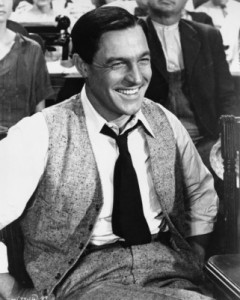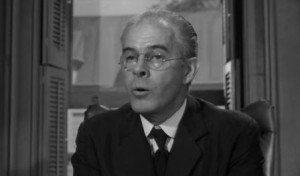“In a child’s power to master the multiplication table, there is more sanctity than in all your shouted ‘amens’ and ‘holy holies’ and ‘hosannas.’ An idea is a greater monument than a cathedral. And the advance of man’s knowledge is a greater miracle than all the sticks turned to snakes or the parting of the waters.” —Henry Drummond (Spencer Tracy) in court
Three men walk through the deserted streets of a town, they meet a fourth man and, together, walk on toward an impressive building with large Roman columns, a schoolhouse. A Western showdown, much like the three outlaws advancing on Marshall Kane in High Noon? No, but in Inherit the Wind there is a confrontation, not of guns but of a moral, more specifically a religious, concept, the basis of a debate that was front-page news in its day. Unfortunately, the debate, far from resolved even at the time, continues to the present moment. Just as pathetic as then, the dogma of Christian fundamentalism now has dangerous and dark political implications.
Fred Zinnemann’s High Noon is enough of a message picture, steeped in the political turmoil (McCarthyism) of its own time, to make an untutored movie-goer assume it was directed by Stanley Kramer. It is Kramer, after all, who is perhaps the most famous of the “message” directors. Think of his On the Beach (nuclear holocaust), The Defiant Ones (racial prejudice), Ship of Fools (plight of the Jews), Judgment at Nuremburg (Nazi war crimes), even Guess Who’s Coming to Dinner (racial intermarriage).
Inherit the Wind, filmed in 1960 in a sometimes loose, sometimes faithful, adaptation of Jerome Lawrence and Robert E. Lee’s three-act play, retells the Scopes Trial of July 1925, the famous—some say infamous—“Monkey Trial.” The theory of evolution as expressed in Charles Darwin’s On the Origin of Species comes head to head with a literal interpretation of the Bible.
Henry Drummond (Spencer Tracy), an alias for the real participating lawyer Clarence Darrow at the time, comes to “heavenly” Hillsboro (Dayton, Tennessee, in history) to defend school teacher Bertram Cates (Dick York), standing in for the actual John T. Scopes, who had broken a state law by teaching evolution. Up against Drummond, the prosecutor is Matthew Harrison Brady (Fredric March) as William Jennings Bryan, who, though not a lawyer was an eminent orator, a three-time candidate for President of the United States and former Secretary of State under Woodrow Wilson.
 Into the mix comes a newspaper reporter from the Baltimore Herald, E. K. Hornbeck (Gene Kelly), standing in for the ever-acerbic H. L. Mencken, who was very anti-Bryan at the trial, calling the local citizens “yokels” and other pejoratives. Kelly’s performance, contrasted with his fellow players, is something of an aberration, almost as if his character were from another play, more accurately perhaps, as if he were a one-man chorus in a Greek tragedy, making detached observations on the happenings. In the play itself, his lines are written in blank verse, and Kelly delivers them in a mocking, sarcastic way that, on a first viewing, seems to clash with the other actors’ lines.
Into the mix comes a newspaper reporter from the Baltimore Herald, E. K. Hornbeck (Gene Kelly), standing in for the ever-acerbic H. L. Mencken, who was very anti-Bryan at the trial, calling the local citizens “yokels” and other pejoratives. Kelly’s performance, contrasted with his fellow players, is something of an aberration, almost as if his character were from another play, more accurately perhaps, as if he were a one-man chorus in a Greek tragedy, making detached observations on the happenings. In the play itself, his lines are written in blank verse, and Kelly delivers them in a mocking, sarcastic way that, on a first viewing, seems to clash with the other actors’ lines.
I like his performance, however—the way his says, “I do hateful things, for which people love me,/And lovable things for which they hate me.” Or asks a monkey in the carnival atmosphere of Brady’s arrival, “Have you come to testify for the defense/Or for the prosecution?” When asked by a townswoman if he needed a nice place to stay, he replies, “I had a nice, clean place to stay, madame,/And I left it to come here.” Referring to Brady, “He’s the only man I know who can strut sitting down.”
The supporting cast includes Donna Anderson as Cates’ girlfriend Rachel Brown (Scopes had neither wife nor girlfriend). Anderson’s only previous movie role, the year before Inherit the Wind, was as Tony Perkins’ wife in On the Beach; thereafter, her roles were mainly confined to TV. Her last appearance was in 1984 in a Murder, She Wrote episode opposite Angela Lansbury.
Rachel’s father, the Reverend Jeremiah Brown, is played by a one-note Claude Akins. His caricature as the bigoted fundamentalist preacher is a bit hard to bear at times—the point seems overdriven!—and the arguments between father and daughter, mainly over religion and her relationship with Cates, go on much too long. Maybe, though, it’s just this ugly image of a bigoted preacher—typical of so many despicable ones in the flesh—that turns me off. Sorry.
 The durable Harry Morgan, the stabilizing influence in over two hundred M*A*S*H episodes and who is ninety-six at this writing, does a much better job than Akins, here as Judge Mel Coffey, who tries not only to maintain order in the volatile atmosphere of his sweltering courtroom but retain his own objectivity, sometimes a bit sarcastically, as once to Drummond: “Well, we certainly want to give you a fair hearing in this courtroom. We don’t want anything prejudicial to your client.”
The durable Harry Morgan, the stabilizing influence in over two hundred M*A*S*H episodes and who is ninety-six at this writing, does a much better job than Akins, here as Judge Mel Coffey, who tries not only to maintain order in the volatile atmosphere of his sweltering courtroom but retain his own objectivity, sometimes a bit sarcastically, as once to Drummond: “Well, we certainly want to give you a fair hearing in this courtroom. We don’t want anything prejudicial to your client.”
Florence Eldridge, Fredric March’s real-life wife, plays Brady’s sympathetic wife, Sarah. Eldridge starred in some six theatrical films with her husband and died in 1988, thirteen years after him. In minor roles are Elliott Reid, Paul Hartman, Jimmy Boyd, Wendell Holmes, Noah Beery, Jr., Ray Teal, Richard Deacon and Norman Fell.
And as the recipient of one of the many spunky one-liners, there’s Will Wright, an often unnoticed veteran of countless TV serials but also of a few remembered movies: Not as a Stranger, Mr. Blandings Builds His Dream House, Cape Fear (1962), The Major and the Minor and All the King’s Men (1949). In the hubbub of that street carnival, Wright, as a Bible salesman, asks Drummond if he is a man of God. “No,” the new arrival replies. “Ulcers.”
Even Brady, whose gluttony is somehow, insensitively perhaps, linked to his literal view of the Bible, draws the line at some of Jeremiah Brown’s demagogy. At a prayer meeting, when the reverend calls on the Lord to “cast hellfire” upon this sinner Bertram Cates, Brady warns, “Remember the wisdom of Solomon in the Book of Proverbs—‘He that troubleth his own house shall inherit the wind.’
There are clues that Drummond, for his own part, has a broader, more objective view than his defense of the teacher of evolution might suggest. Although at times he takes a light, even boorish approach to the court proceedings, on other occasions he is quite different, deep enough that Brady asks him to repeat a question (or is Brady just a little dense?). “How can you be so cocksure,” Drummond asks, “that the body of scientific knowledge, systemized in the writings of Charles Darwin, is any way irreconcilable with the book of Genesis?” (This is one of several hints at the turnabout ending of the film, revealing Drummond’s liberal philosophy on religion.)
